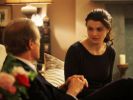Eye For Film >> Movies >> Page Eight (2011) Film Review
A political thriller that's defiantly old-fashioned in execution but would-be radically pertinent in concern, it speaks volumes about the quality of modern TV programming that David Hare's return to the British small screen is being wheeled out theatrically on the international circuit. He's certainly assembled a top-flight cast, with curmudgeonly national treasure Bill Nighy making a drolly witty protagonist, supported by A-listers such as Rachel Weisz as his neighborly love interest and Ralph Fiennes as a dangerously unscrupulous PM. However, the intrigue feels under-cooked and the subject matter is yesterday's news, robbing an admirably action-free mystery of much of its impact.
MI5 rapscallion Johnny Worricker (Nighy) is somewhat legendary in his field and disreputable in method, being therefore regarded as a significant threat to those in power. The suspicious death of his boss and best friend leads him on a crusade to expose the UK government's complicity in the US's regime of torture, as highlighted on the titular page of a controversial report. Its publication could have a house-of-cards effect for many of those wielding parliamentary power, putting Worricker in the firing line at work and later on the street. His attractive activist neighbour (Weisz) is also proving a distraction for the relationship-shy agent, but her own agenda could be the catalyst for uncovering the truth of exactly who is involved in the cover-up of Page Eight.

Hare's film strikes a strange balance between quirky drama and mystery thriller, but it never quite comes together as a satisfying, cohesive whole. It is elegantly shot and uses a variety of chilly London locations to give proceedings an air of vague menace - Worricker's familiarity with his surroundings is juxtaposed with his all-too-obvious awareness that they could be concealing danger - but the pace never really picks up beyond that of a moderately engaging TV programme. It's been funded by BBC2 but you can almost feel where the ad breaks should be due to the episodic structure.
Nighy is as appealing as ever but his character's mix of world-weary cynicism and wrinkly smarm makes him hard to root for, despite his obvious belief in his principles. The friendship between Worricker and a scene-stealing Michael Gambon gets the audience invested in the quest for justice that ensues, but Hare missteps by replacing this dynamic with a burgeoning romance involving the young-enough-to-be-his-daughter Weisz. Despite her understandable attraction to his cultured tastes, honest approach and conviction in his cause, the implausibility of their friendship is undeniable. It initially furnishes proceedings with some tangible ambiguity, but once Weisz's true colours are revealed, her character becomes something of a footnote in Worricker's now over-flowing casebook of noble pursuits.
The relationships between Worricker and his artist daughter and estranged ex are also somewhat strained in execution as well as character. Felicity Jones's young artiste betrays an effective mix of longing for her absent father and unbridled disdain for his complete and utter insensitivity, but their relationship is never convincing or particularly revealing of anything other than cliched neuroses. Similarly, Alice Krige juxtaposes her well-wrought grief with a heart-breakingly reluctant plea for her ex to get to the bottom of her husband's death, adding another layer to Worricker's motivations, but otherwise their exchanges are so cold that the audience struggles to see how they could ever have been a couple.
There's enough acidic humor to keep things from becoming too maudlin, and the cast are all excellent despite sometimes having interchangeable personalities and spouting dialogue that often smacks of nothing more than Hare's own political opinion. Ralph Fiennes is especially impressive in a brave and unflattering role that harks back to his Schindler's List breakout, in a calculated manner that will hopefully make the likes of Blair and Cameron blanche. However, Page Eight sadly never quite transcends its trappings; it's a classy and serviceable pot-boiler but neither as clever or as righteous as you might hope, or as Hare obviously intended.
Reviewed on: 01 Sep 2011

















